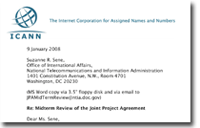On Thursday 28 February 2008, the U.S. Government’s Department of Commerce held a public meeting in Washington DC to review the Joint Project Agreement (JPA) between it and ICANN at its mid-point.
The agenda and list of panellists can be found on this webpage, and a transcript of the meeting will be linked to here as soon as it is made available. ICANN Chairman Peter Dengate Thrush provided the penultimate comments, followed by a meeting summary by Acting Assistant Secretary of Commerce for Communications and Information, Meredith Attwell Baker. His remarks and input to the meeting can be found on a separate webpage here.
What is the JPA?
On November 25, 1998, the United States Department of Commerce (DOC) on behalf of the United States Government (USG) entered into a Memorandum of Understanding (MOU) with the Internet Corporation for Assigned Names and Numbers (ICANN), a private sector, not-for-profit corporation. The purpose of this was to effect the transition of Domain Name System management to the private sector.
Now - more than nine years and seven versions of the MOU later - ICANN and the U.S. Department of Commerce are assessing ICANN’s performance with regard to 10 responsibilities set out in a Joint Project Agreement (JPA) signed in September 2006. At the time of the signing, a Midterm Review to be held in February 2008 was announced.
On this page you will find a number of resources:
- ICANN Chairman’s address to the Midterm review meeting
- Transcript of the Midterm review meeting (coming soon)
- Our submission to the U.S. Department of Commerce
- A review of press coverage of the Midterm Review
- Public comments to the review process
 ICANN’s
input and submission
ICANN’s
input and submission
On 28 February 2008, the United States Government’s Department of Commerce held a public meeting to discuss the JPA. ICANN Chairman Peter Dengate Thrush provided the penultimate comments to the meeting. You can view them in full here.
In his address, Dengate Thrush argued that:
I think that after almost 10 years of experience of this model the question before us is very stark: Are we going to complete the White Paper’s vision of private sector management of the Internet’s system of unique identifiers? I believe the overwhelming view from virtually all participants is that transition is the goal and the interest is in settling how we get there.
He concluded:
We all now need to work together over the 18 months remaining in the JPA to finalize the model for the long term.
Prior to that meeting, on 9 January, ICANN made its submission with respect to the JPA Midterm Review.
This submission came in two parts. A submission letter [PDF, 100K], signed by the Chairman of the Board, and a table of achievements [PDF, 504K]. You can find both in multiple languages below.
This submission was in addition to a section in ICANN’s Annual Report for 2007 [PDF, 1,840K] in which one section was dedicated to the Joint Project Agreement in which ICANN outlined the work it had done in meeting its responsibilities.
The submission letter concluded:
As this submission points out, the JPA was a necessary instrument in ICANN’s formative years. But now, the JPA contributes to a misperception that the DNS is managed and overseen on a daily basis by the U.S. government.Ending the JPA will provide long-term stability and security for a model that works. It will provide confidence to all participants that the investment of time, thought and energy for over nine years has secured an Internet coordination body that will always be owned by all stakeholders, not managed or overseen by any one entity.
- English [PDF, 100K]
- [PDF, 164K] العربية
- 中文 [PDF, 237K]
- Français [PDF, 125K]
- Español [PDF, 116K]
- Русский [PDF, 233K]
- Português [PDF, 77K]
Table of achievements:
Press Coverage
"The overseer of the net’s addressing system has asked the US government to be freed from official control. Icann made the plea in a lengthy report sent to the US Department of Commerce."
"The body which oversees the internet may become independent from the US Government for the first time, paving the way for one of the world’s most important resources to be run by the private sector."
"The chairman and board of directors of ICANN, Chairman, Mr. Peter Dengate Thrush, says ICANN has ‘outgrown’ the expectations of the JPA."
"ICANN, the group charged with overseeing the Internet’s addressing system, has submitted a report (PDF) to the US Department of Commerce in which it argues that the time has come to end US oversight."
"ICANN, the body that oversees the world’s domain registries and internet policy, has formally asked the US government to let it be transferred to the private sector."
"The organization which oversees the Internet’s addressing system -ICANN- says it’s ready to be operate without the oversight of the U.S. Department of Commerce."


